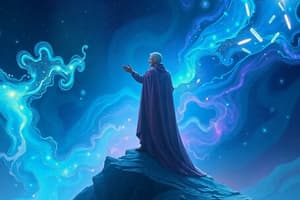Podcast
Questions and Answers
What is the main difference between monism and dualism?
What is the main difference between monism and dualism?
- Monism focuses on the material world, while dualism focuses on the spiritual world.
- Monism is a more recent philosophical concept, while dualism is an older concept.
- Monism is a more complex philosophical concept, while dualism is a simpler concept.
- Monism reduces all beings and phenomena to a single idea or substance, while dualism affirms the existence of two substances. (correct)
Who was the early philosopher who believed that everything comes from water?
Who was the early philosopher who believed that everything comes from water?
- Aristotle
- Hegel
- Thales of Miletus (correct)
- Plato
What is the main difference between the monist views of Hegel, Spinoza, and Berkeley?
What is the main difference between the monist views of Hegel, Spinoza, and Berkeley?
- Hegel, Spinoza, and Berkeley were all materialist monists, but they differed in their approach.
- Hegel was a materialist monist, while Spinoza and Berkeley were idealist monists.
- Hegel, Spinoza, and Berkeley were all idealist monists, but they differed in their approach. (correct)
- Hegel and Spinoza were materialist monists, while Berkeley was an idealist monist.
What is the influence of Marx and Engels' materialist monism on modern science?
What is the influence of Marx and Engels' materialist monism on modern science?
What is the 'Chalmers' bet' in the context of modern science?
What is the 'Chalmers' bet' in the context of modern science?
What is the author's perspective on the nature of reality?
What is the author's perspective on the nature of reality?
What is the author's analogy for understanding the world?
What is the author's analogy for understanding the world?
What is the main difference between the monist views of Marx and Engels and the monist views of Hegel, Spinoza, and Berkeley?
What is the main difference between the monist views of Marx and Engels and the monist views of Hegel, Spinoza, and Berkeley?
Flashcards are hidden until you start studying
Study Notes
Monism vs. Dualism
- Monism is a philosophical concept that reduces all beings and phenomena in the universe to a single idea or substance, opposing pluralism.
- Dualism, on the other hand, affirms the existence of two substances, material and immaterial, which interact with each other.
Historical Background
- Monism was the initial stance of philosophy, with early philosophers like Thales of Miletus, who believed that everything comes from water.
- Later, philosophers like Plato and Aristotle emerged with dualist views, where the immaterial (spirit) interacts with the material (body).
- After the Middle Ages, monism resurfaced, but this time, it was idealistic, focusing on the role of thought and consciousness.
Monist Philosophers
- Hegel: Idealist monist who believed that reality is only ideal and that the absolute idea is the ultimate reality.
- Spinoza and Berkeley: Also idealist monists, but with a different approach.
- Marx and Engels: Materialist monists who believed that the world is material by nature and that all phenomena are forms of matter in motion.
Modern Science and Monism
- The materialist monism of Marx and Engels influences modern science, which seeks to explain consciousness through physical processes in the brain.
- The "Chalmers' bet" is an example of this, where scientists are trying to find the physical basis of consciousness.
The Author's Perspective
- The author is inclined towards dualism, with a slight inclination towards idealism, and sees life as a "video game" where science is a tool to explore the world, but ultimately, there is more to reality than what can be observed.
Monism vs. Dualism
- Monism is a philosophical concept that reduces all beings and phenomena to a single idea or substance, opposing pluralism.
- Dualism affirms the existence of two substances, material and immaterial, which interact with each other.
Historical Background
- Thales of Miletus, an early philosopher, believed that everything comes from water, marking the initial stance of monism.
- Philosophers like Plato and Aristotle later emerged with dualist views, positing the interaction between the immaterial (spirit) and material (body).
- Idealistic monism resurfaced after the Middle Ages, focusing on the role of thought and consciousness.
Monist Philosophers
- Hegel, an idealist monist, believed that reality is only ideal and that the absolute idea is the ultimate reality.
- Spinoza and Berkeley, also idealist monists, approached the concept differently.
- Marx and Engels, materialist monists, believed that the world is material by nature and that all phenomena are forms of matter in motion.
Modern Science and Monism
- The materialist monism of Marx and Engels influences modern science, which seeks to explain consciousness through physical processes in the brain.
- The "Chalmers' bet" is an example of this, where scientists are trying to find the physical basis of consciousness.
The Author's Perspective
- The author is inclined towards dualism, with a slight inclination towards idealism.
- The author views life as a "video game" where science is a tool to explore the world, but ultimately, there is more to reality than what can be observed.
Studying That Suits You
Use AI to generate personalized quizzes and flashcards to suit your learning preferences.




